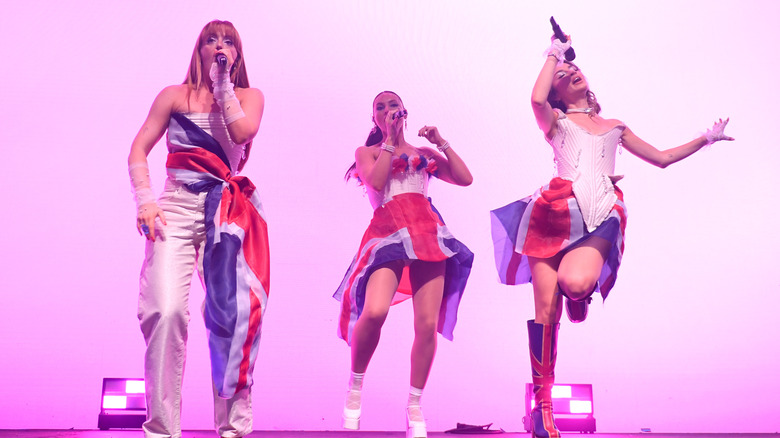The 2 Countries That Have Won Eurovision The Most
Over the course of its 70-year existence, the Eurovision Song Contest has been hotly contested, with individual competing countries lucky to have won it one or two times during that period. However, a handful of the 52 countries that have taken part over the years have emerged victorious time and time again.
Israel, for example, has taken the most points at Eurovision four times, most notably with the irresistible "Diva" by Dana International in 1998, while France, Luxembourg, the Netherlands, and the United Kingdom have each won it five. But when it comes to delivering continent-spanning competition-ready pop hits, two countries have done better than any other: Sweden and Ireland, both of which have emerged victorious in Eurovision an amazing seven times.
It would be naive to suggest that Eurovision results are based entirely on the objective quality of the songs. In fact, though the competition is considered to be a light-hearted and, to many viewers, somewhat ironic television spectacle, some critics have suggested that voting among countries may have a political aspect, with friendlier countries tending to vote for each other while avoiding those with which they have geopolitical tensions or disputes. Eurovision organizers claim that the competition is strictly apolitical — though Ukraine's triumph following the start of the Russian invasion in 2022 seemingly gave credence to that claim. So why have Ireland and Sweden been so successful at Eurovision?
Ireland's hot streak ... and barren spell
Ireland is a country of just over 5 million people that nevertheless packs a huge cultural punch. The country has 10 Nobel laureates, including four in literature, and the Irish tradition for poetry and song is as synonymous with the country as its reputation for friendliness and the love of craic. The country has produced countless music legends, including Sinead O'Connor, U2, The Dubliners, The Pogues, and Thin Lizzy.
It is little surprise, then, that Ireland has historically performed well in the Eurovision Song Contest. The country first participated back in 1965, entering the song "I'm Walking the Streets in the Rain" by Butch Moore, which placed a respectable sixth, gaining 11 points. Their first win came in 1970, with Dana's "All Kinds of Everything," which gained 32 points. Ireland would have to wait another decade to enjoy Eurovision success, with Johnny Logan coming out on top in 1980 and 1987 with "What's Another Year" and "Hold Me Now" respectively, making himself a Eurovision legend in the process. However, that was just a taste of what was to come. In the 1990s, Ireland took home the Eurovision top spot four times, including winning the competition three times in a row with different artists in 1992, 1993, and 1994.
That was Ireland's golden age. Since the turn of the century, the country has generally struggled in the competition, failing to qualify 11 times, much to the disappointment of Irish Eurovision devotees. However, there have been some shoots of optimism in recent years, with Ireland placing sixth with "Doomsday Blue" by Bambie Thug in 2024, suggesting to experts that an Irish Eurovision resurgence might be afoot.
Sweden's consistency and 21st century champions
You can't talk about Sweden at the Eurovision Song Contest without discussing one particularly iconic band. No, we're not talking about Blond who finished a disappointing 14th with "Bara hon älskar mig" in 1997. We are of course talking about Bjorn, Benny, Agnetha & Frida, better known as the members of ABBA.
ABBA delivered Sweden its first-ever Eurovision win in 1974 with the breakthrough hit "Waterloo," which topped the charts in several countries. Whereas Eurovision is sometimes criticized for producing one-hit wonders, the song made them international stars. It came after several close calls, with the Scandinavian country placing fifth just the year before, and the country would have to wait another decade for another win when "Diggi-loo Diggy-ley" by Herrey's took home the top price in 1984.
Since then, Sweden has remained consistent, winning twice in the 1990s, coming close several times in the 2000s, before 2012, when everything changed. "Euphoria" by Loreen was a sensation, taking 372 points and becoming a worldwide smash that still remains a dance floor filler. Sweden emerged victorious just three years later thanks to Måns Zelmerlöw's "Heroes." Their third 21st-century success once again was down to Loreen, who returned in 2023 with the winning song "Tattoo." Since 2010 when they sadly failed to qualify, Sweden has finished in the top 10 a total of 11 times, an astonishing record that confirms the country as an elite force in Eurovision.
